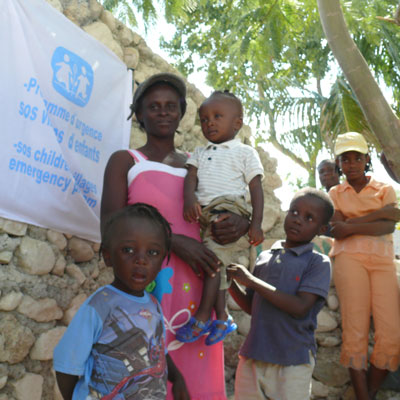Haiti Orphan Appeal: what the earthquake did to one life

Haiti Orphan Appeal: another life ruined; some details of what the earthquake did to one more
See Haiti Earthquake Orphan Updates Haiti Earthquake Orphan Appeal and Sponsor an Earthquake Orphan
The images are all too familiar to us: for days now, our SOS Children relief team have been driving through Port-au-Prince, past ruined houses and emergency relief camps.
We have 36 community distribution points now where every day we go, provide food (for more than 4000 children) and our nurse tries to help with universal coughs, worms and eczema from living on the streets. We provide food for the children from the poorest areas and try to distract them from the misery of their daily lives. By distributing this way at least we can be sure that children are not forgotten in the struggle for survival.
The stories of the children and mothers in these places become familiar and blur into each other as well. One of them is Soraja Beaujour (pictured) puts it, "Our simple lives were devastated in a few seconds. We didn't have much, but we had a small house, and we were together. I want to turn back the clock, and get my life back again.” The earthquake took everything she had. Her house was destroyed, and her husband and eldest daughter both died. Since then she has been living on the streets with her three sons.
Even before the earthquake many people needed aid. Poverty an overused word when we talk of children in the UK who don't have a gameboy as "poor". Here already was the real thing, just managing to shelter from the weather and eat. Hardly any education, and little prospect for improvement. Most importantly, no reserve, no capacity to cope with additional trauma, life right on the edge. This was the reason before the earthquake why we had already set up 16 community centres to provide children and families with the bare essentials.
Then the disaster struck. The human suffering has increased beyond belief. Nearly everyone has lost all their worldly goods, most of them are mourning close relatives, and children are sick and malnourished.
"We are still sleeping on the streets. Now at least we have a sheet to cover ourselves, but not much else." Soraja is just one of many who wait every day for the community to gather in her district and the arrival of the SOS bus. Food is distributed and the people immediately begin to cook communally.
"It's about more than just eating for us - we get together. It makes a welcome change that brightens up our everyday lives. After the meal some SOS staff play with the children, and they laugh and dance together. This gives us and the children strength and confidence. We feel that we are not forgotten on the streets, and that someone is there for us.”
These are all things that families like Soraja's desperately need.
We are steadily expanding our work across the poorest districts, taking aid directly to the children. It is not just be a case of distributing food parcels, we need to empower communities to help themselves.
Soraja sits at the side while her children sing and dance. Now and then a little smile flashes over her face, even though her eyes are looking beyond the moment into a future filled with worries. But these moments give her support and some hope, before she starts looking again for a place to sleep on the streets with her three young sons.

 Return to Schools Wikipedia Home page…
Return to Schools Wikipedia Home page…
